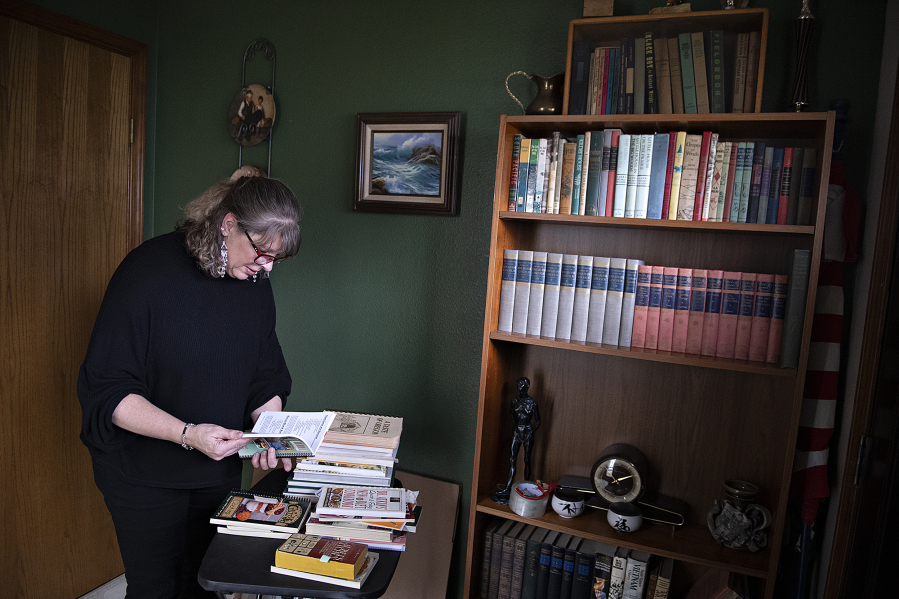When I asked readers to tell me if they thought they might have too many books and what they were doing with them, I was unprepared for the flood of responses. I interviewed or corresponded with about 30 avid readers. Here’s a sampling of what they had to say, edited for length and clarity.
I experienced the perfect storm of book abundance last spring. I’m nearing retirement from elementary teaching and have accumulated quite a collection over the years. I teach at Mill Plain Elementary, which is currently under construction. Not only was I trying to clear out my parents’ estate, I had to eliminate about half my student library prior to moving to our temporary building. I sent dozens of books home with individual students and twice filled my Crosstrek to deliver boxes of books to Goodwill. My parents were “collectors” and I delivered at least as many of their books to Goodwill as well. I had considered Vintage Books, but I didn’t want store credit to buy more books!
— Beky Rasmussen, Yacolt
My family loves to read. My childhood home was filled with books, including those from my grandfather dating to the 19th century. We had an encyclopedia from 1899 I loved to read.
My mother lived a long life and died at nearly 102 in the middle of reading a history book. When I visited her in the last years, we would sit reading because she was too deaf to carry on a conversation, but we could enjoy each other’s company. Fortunately there are libraries and I borrow constantly but I still own too many books. This is something that compounds as people of the boomer generation get older. Where are all their books going to go if they are like me and have no grandchildren or family in the area?
— Cynthia Heise-Swartz, Felida
I grew up with the saying, “You can never be bored if you know how to read.” I believe books are to be shared, so frequently I pass along “the good reads.” Friends know any book in the basket by the door is fair game. It’s often easier to simply give your books away than haul a box to Powell’s or Vintage for credit.
— Chris Dickinsen, Vancouver
My husband and I absolutely love books and own a few thousand at a best guess! We’re 65 and 70 with no kids, so it’s long past time to let our excess books go. But what if that one in the corner, slightly dusty, turns out to be a real treasure?
— Patrice Stewart, Vancouver
My teenage daughter and I have way too many books and we love reading. I am a children’s literature professor and have a huge library at Washington State University Vancouver. We are book fairies. We drive around to the Little Free Libraries and stuff them with books we have read and no longer want. Unfortunately, we also grab a book or two, too.
—Deanna Day-Wiff, Vancouver
I always have too many books. They are so hard to part with. When I remodeled and removed a 10-by-6-foot bookshelf, I donated 75 books to the Friends of the Library sale. I still hoarded my hard copy of favorites and kept about 25 books. I currently have about 60 books that I have already read. In the past, I would take a bag full of books to donate at semiannual Friends of the Library sales and then buy about 15 books to take home at 25 cents piece. They have a permanent sales shop in front of the Vancouver Community Library. I load up four or five books in my backpack and hop the bus over to that shop. I donate the old and buy four or five new ones. The Friends always earn twice on my books.
— Sandy Schilaty, Vancouver
There’s books here I’ll die with. I have a glassed-in bookcase with some first editions by Gary Howells, a master of building bamboo fly rods. I fished with him in Montana. Those are the kind of books I will keep.
— Craig Lynch, Ridgefield
The only room in our house that doesn’t have a bookshelf is the bathroom.
— Kathy Powell, Vancouver
I do have a terrible book addiction. I prefer a real book, the feel of turning the pages, the smell of a book. An e-reader is not my thing. I don’t have one. I end up with a lot of books. At some point you do have to make the purge. It’s so daunting.
— Vicki Vega, Camas




